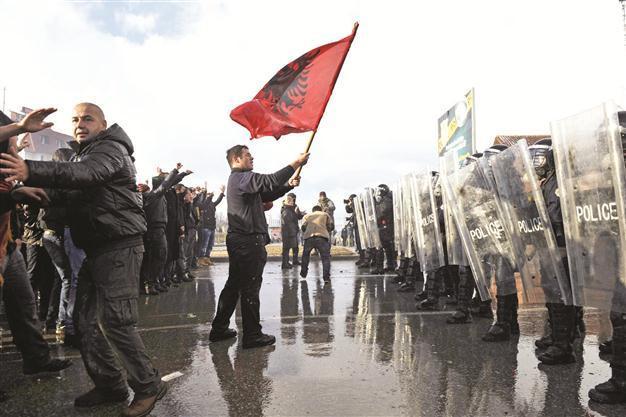Police clash with Kosovo Albanians
PODUJEVO, Kosovo - Agence France-Presse

Kosovo Albanians clash with police in Kosovo. Police arrested 146 protesters. AFP photo
Police used tear gas and a water cannon to disperse hundreds of Kosovo Albanians who tried to blockade the border with Serbia, arresting 146 protesters.At least 52 people, including 31 police officers, were injured in clashes at two border crossings, police said in a statement released in Pristina. They said they were “forced to react” after being pelted with stones and metal objects by members of the Kosovo Albanian Self-Determination movement, which opposes any contact with Serbia.
Self-Determination, led by hard-line opposition leader Albin Kurti, had announced plans to temporarily block the border in order to bar Serb products from entering Kosovo. Kurti joined protesters waving Albanian flags, saying: “Serbia is an enemy country for Kosovo, that is why our motto is ‘Serbia will not pass through’.” After an hours-long confrontation, police managed to disperse the protest and restore traffic on the road leading from the border to Pristina, allowing two trucks from Serbia across under police escort.
Police had earlier cordoned off the road outside the northern town of Podujevo, some six kilometers from the border with Serbia, to prevent the movement from blocking two border posts. In an initial clash, security forces pushed the crowd back with batons and pepper spray.
Later in the day police and protesters clashed also near another border post, Konculj, some 70 kilometers east of Pristina. The government in Pristina and the international community denounced the blockade, and Kosovo Prime Minister Hashim Thaci has said his government would do its best to prevent it.
In a statement released after the protest, the Kosovo government urged the leaders of Self-Determination “to restrain from the use of violence and attempts to block the freedom of movement guaranteed by the constitution.” Belgrade and Pristina have been at loggerheads over bilateral trade ever since Kosovo, which has an ethnic Albanian majority, unilaterally proclaimed independence from Serbia in 2008. However in September, after months of EU-mediated negotiations, the two sides agreed to implement a free trade agreement. Neither Kosovo’s minority Serbs nor Belgrade recognize Pristina’s 2008 declaration of independence, accepted by most of the European Union and many other countries, considering Kosovo still to be a province of Serbia and the cradle of its nation and religion.
















